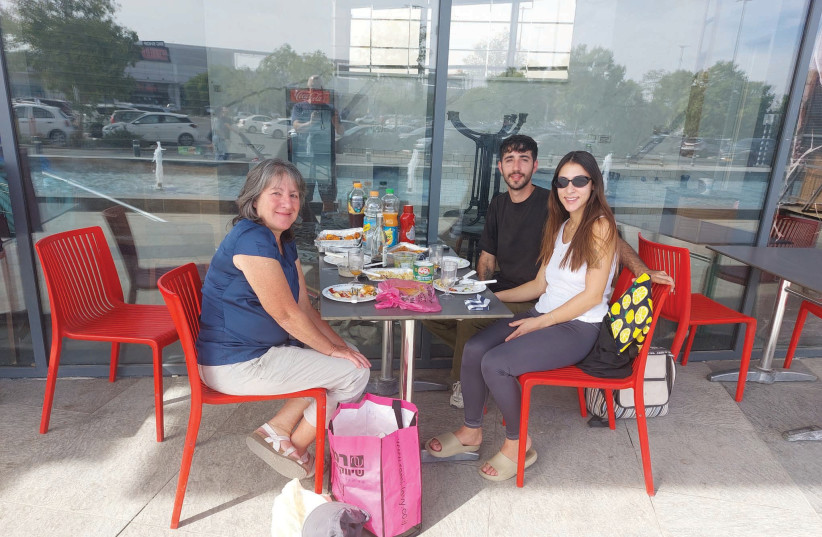October 23
The release of four hostages held by Hamas is a wonderful thing. Their return to their families after two weeks in captivity should be celebrated. But don’t forget for a second that they represent under 2% of the 200+ Israeli children, women, elderly, and citizens of the world still being held – and are being denied visits by the Red Cross.
And don’t forget that Hamas isn’t doing this as a “humanitarian” gesture but as a cynical ploy.
And don’t forget October 7.
Never forget October 7. Because they can release all the hostages, but the war will continue until Hamas is no longer.
October 26
The scene from Mosh’s Beach, the bohemian Red Sea paradise just south of Eilat.
Dozens of beautiful young Israelis, some of whom might have been survivors of the Supernova music festival massacre by Hamas less than three weeks ago.

Today, they were singing songs of peace, swimming, getting high, hugging, and trying to remember what life is like. Israeli resilience at its best.
It’s where we have also escaped for four days – intent on recharging, breathing, and assessing the damage done, and the road to recovery. The kids around us are showing the way.
November 3
Talking to a friend today in Jerusalem, whose daughter, Maya, recently graduated from Harvard. She’s now back in Israel, called up to her IDF unit, and now near the Gaza border, fighting Hamas terrorists with rockets aimed at her.
My friend and his wife were watching news reports about virulent anti-Israel protests taking place at US universities, including Harvard.
His wife turned to him and said, “Thank God that Maya isn’t there anymore. It looks dangerous.”
November 6
It’s been 30 days since Black Sabbath, the morning massacre that changed Israel forever.
In Jewish tradition, 30 days mark the end of the initial mourning period after the death of loved ones; around the country, there were candle-lighting ceremonies and moments of silence for the 1,200 killed and mutilated, the 240 being held by Hamas, and the dozens of soldiers who have fallen in Gaza since the war began.
In my city of Ma’aleh Adumim, like in many places throughout the country, there was an installation set up with 240 chairs displaying the names and photos of the children, the elderly, and men and women whose fate is unknown.
At the end of the ceremony, the young children and widow of Avraham Henkin, one of three soldiers from my city who was killed defending Israel in Gaza, lit a torch in memory of all who have fallen.
Then we all sang the national anthem “Hatikva.” It was the first time I heard it since the war began, and its lyrics, sung by everyone in the crowd, about the yearning to live free in our own land, rang clear, like a loud bell.
The resilience of Israel is amazing... its spirit is not broken, and it will prevail.
November 8
Israel’s main news radio channel KAN Bet – and its flagship morning program hosted by Asaf Lieberman and Kalman Liebskind, who have done an amazing job covering the human side of this war – had an interesting factoid this morning. The location with the most rocket alerts since October 7 has been the southern city of Ashkelon, not far from the Gaza border.
Over 170 of them – an average of five times a day of heading to the safe room or ducking outside as Hamas fires a rocket trying to kill you.
KAN Bet interviewed three residents who hadn’t left for safer environs. One of them, an older woman, recalled how she had escaped for a while to Jerusalem, but that the hotel she was put up in didn’t have clean cups, and the tea selection wasn’t good. So she decided to return to her home in Ashkelon.
Liebskind summed it up, saying, “So, you get rockets a few times a day, but you get good tea.”
Some things are worth it.
November 11
A mom, a dad, and a girlfriend sprang a soldier from his base in the south of Israel today and brought him to a nearby mall.
In the food court (closed for Shabbat), they occupied an outdoor table (something Israelis have lots of experience with) and treated him to a homemade lunch made by the mom of chicken, sweet potatoes, macaroni salad, challah, and red velvet cake.
It almost felt normal, sitting in the 80 degree weather and enjoying each other’s company.
Ten minutes on the road back home, the red alert of rockets being fired interrupted the radio talk show, and the location targeted was... exactly where the mom and dad were.
They pulled over to the side of the road, heard the Iron Dome intercept the rockets (fired from the soldier’s base), and then continued driving.
Almost felt normal.
